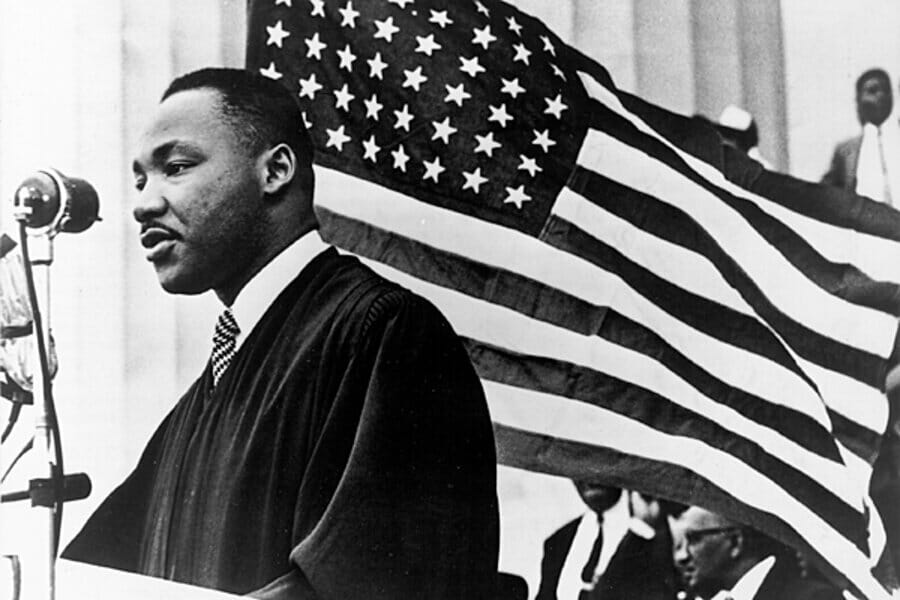
Beyond American Christianity: Martin Luther King, Jr. and the love ethic of Jesus

Rev. Dr. Greg Johnson
January 18, 2021
There are very few people who are not familiar with boxes. While they may come in various shapes and sizes, there is a common element. That common element is that the purpose of a box is to contain the contents of what is placed within. A box communicates clearly by its very design that its ultimate purpose is to contain anything that is placed in it.
Historically, early American settlers sought to escape Great Britain for religious freedom. It appeared that Great Britain’s religion was too restrictive, restraining, and lacked the resolve to connect with those who disagreed. Those who sought out passage to a new world were escaping the box of religious intolerance. Yet as church historian Justo L. Gonzalez writes, those who struck out for religious freedom, when arriving and settling in the New World, “were no more tolerant than were the government from which they were fleeing.”[i]
This intolerance would be grounded in the philosophical and ideological framework of the New World. As the colonies developed, religious diversity developed. However, the driving force was not religious freedom but economics. In the New World, the members of the Virginia Company were still members of the Church of England. Their focus was on cultivating land for the purpose of growing and exporting tobacco. This enterprise yielded a large margin of success. However, the workforce needed was not available in the new world. Gonzalez observes that “Since this required much labor, by 1619 the colony began importing slaves from Africa.”[ii] The greed of the Virginia colony (and the subsequent British colonies on the American continent) was illustrated in the use of humans for economic gains. This thriving economic enterprise fueled the financial growth of the colony, enabling financial stability as well as the future for independent sovereignty. While the fiscal foundation grew, the labor required to maintain this growth was fed by more imported slaves from Africa.
Having humans as slaves caused an issue for the Christians of the Church of England. Some Englishmen thought of converting enslaved Africans; however, Christians were prohibited from owning fellow believers as slaves. To circumvent this prohibition, the Colony skillfully maneuvered around this significant issue by not converting slaves. This laid the perimeters that would fashion religion in the new world.
Religious history is populated with boxes of intolerance and restriction. We do not need to look any further than the Gospels themselves. The very death of Jesus was the product of a faith confined in a box. The message of Jesus was to liberate individuals from this confinement and to remove the restrictions that hindered spiritual growth and life. For those who found the box comfortable and safe, this was and is a threat. Unfortunately, the boxes that religion constructs are not liberating.
King aptly grasped that the love Jesus displayed and taught was not reflected in American Christianity. American Christianity sought a gospel that suited itself, not a gospel that drew individuals closer to their Creator. King had moved beyond American Christianity, comprehending a belief that united humanity. As we reflect on Dr. King’s legacy, may we hear the messenger that spoke beyond American Christianity and challenged us. May the message of loving one’s neighbor challenge us to live lives that reflect the message Jesus proclaimed. May we find ourselves being the good Samaritan on the Jericho road, in Jesus’ parable, regardless of the stranger’s ethnicity, gender or age. May we reflect on the love ethic taught by Jesus and preached by King. May this message empower us to resist hate and recognize that we are all connected in the tapestry of life.
Yet out of the clay hills of Georgia rose the son of a Baptist preacher, Martin Luther King, Jr., who would not only speak beyond the box but fan the flames that threaten to burn the box. King spoke beyond the box of American Christianity that was deeply rooted in the fragility of white America. The message that King preached was antithetical to the ethos of white America. It was an affront to the box of intolerance that contained white America’s fears, misdeeds, and misinformation. This was not a new message; it was not a message that King extrapolated out of thin air. It was a message deeply woven into the fabric of the life work of Jesus. Conversely, the box that American Christianity created was unable to accommodate this message. The words that came from a descendant of slaves, individuals not considered humans, Africans imported for the use of their bodies, were words declaring tolerance and love. Tolerance for our difference and love to overcome what potentially divides us.
King’s spiritual maturation enabled him to look beyond the preconstructed box of American Christianity and grasp the teachings of Christ. This was no small feat as King was born into a culture that struggled at the hands of their oppressor. What King proclaimed was different in that the message caught many of his colleagues and members of the black community off guard. Here was a message that called those who were being oppressed to love those who had their boots on their neck. Here was a message that demanded that followers of Jesus love those who persecuted them. In the heat of segregation and Jim Crow, this message may have sounded pessimistic to those who had a faulty understanding of Jesus’ love ethic. As King resonated the love ethic of Jesus, it was not restricted to the oppressed. This bold “drum major for peace” was fearless in speaking to the oppressors as well.
King appropriately understood that love requires more strength than hate. To love regardless of how badly one is being treated takes tremendous strength. I believe King comprehended the love Jesus illustrated in dying for humanity. It was this understanding that compelled King to be unrelenting in his discourse on the strength to love. King synthesized his theological and social justice concept not only in his sermons but in the book “Strength to Love,” written in 1963.
King aptly grasped that the love Jesus displayed and taught was not reflected in American Christianity. American Christianity sought a gospel that suited itself, not a gospel that drew individuals closer to their Creator. King had moved beyond American Christianity, comprehending a belief that united humanity. As we reflect on Dr. King’s legacy, may we hear the messenger that spoke beyond American Christianity and challenged us. May the message of loving one’s neighbor challenge us to live lives that reflect the message Jesus proclaimed. May we find ourselves being the good Samaritan on the Jericho road, in Jesus’ parable, regardless of the stranger’s ethnicity, gender or age. May we reflect on the love ethic taught by Jesus and preached by King. May this message empower us to resist hate and recognize that we are all connected in the tapestry of life.
The Rev. Dr. Greg Johnson is pastor of Cornerstone Community Church, Endicott, N.Y.
The views expressed are those of the author and not necessarily those of American Baptist Home Mission Societies.


